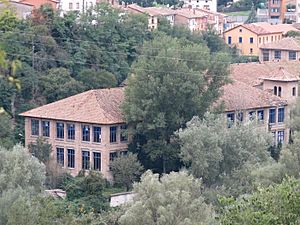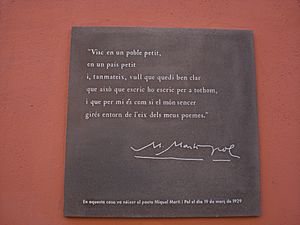Miquel Martí i Pol facts for kids
Miquel Martí i Pol (born March 19, 1929 – died November 11, 2003) was one of the most famous and widely-read Catalan poets of the 1900s. He wrote more than 1,500 poems during his life.
Contents
Life Story of Miquel Martí i Pol
Miquel Martí i Pol started working at a textile factory office when he was just 14 years old. He published his very first poems at the age of 15.
In 1959, he wrote a collection of poems called La fàbrica (The Factory). These poems were based on his experiences working in the factory. However, they were not published until 1970. His family was worried that publishing them might cause him to lose his job.
He continued to work at the factory until 1973. At 43 years old, he had to stop working because of a health condition called multiple sclerosis. This illness made it difficult for him to continue his job.
Martí i Pol lived his entire life in his hometown of Roda de Ter. He cared deeply about the people in his town and at the factory. He also felt a strong connection to their social class. He once wrote: “I want to speak of them/in speaking of people today/ I want to speak of them. Without them, I do not exist.”
In his very popular book of poems, Estimada Marta (Dear Marta), he showed he could also write beautifully about love between a man and a woman. This book sold over 100,000 copies. In his later works, he often wrote about love, desire, and death.
Miquel Martí i Pol was married two times. He had two children from his first marriage.
Important Books and Poems
Here are some of his most important works:
- 1954: Paraules al vent
- 1966: El poble
- 1972: La fàbrica
- 1972: Vint-i-set poemes en tres temps
- 1975: L'arrel i l'escorça
- 1976: El llarg viatge
- 1977: Amb vidres a la sang
- 1978: Estimada Marta
- 1991: Suite de Parlavà
- 2002: Després de tot
Martí i Pol as a Translator
Besides writing his own poetry, Martí i Pol also translated more than 20 books. Most of these books were originally in French. Some of the famous authors he translated include Saint-Exupéry, Simone de Beauvoir, Apollinaire, Flaubert, Barthes, Lévi-Strauss, and Zola.
His Role in Politics
Martí i Pol was an active member of a political group called the PSUC. This was during the final years of the Franco dictatorship in Spain. He joined the party in 1968. He left in 1982 after a comment from Santiago Carrillo, a leader of the Spanish Communist Party. Carrillo said the PSUC was "too Catalan and little Spanish."
See also
 In Spanish: Miquel Martí i Pol para niños
In Spanish: Miquel Martí i Pol para niños
 | Valerie Thomas |
 | Frederick McKinley Jones |
 | George Edward Alcorn Jr. |
 | Thomas Mensah |



